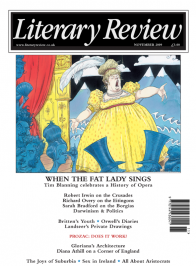Tim Blanning
High Notes
The Gilded Stage: A Social History of Opera
By Daniel Snowman
Atlantic Books 482pp £40
This consistently entertaining and stimulating history of opera gets off to cracking start with a quotation from a doleful letter to The Times written in 1853 by a gentleman identifying himself only as ‘C T’. Although in possession of a ticket for which he had paid the princely sum of seven shillings, he was denied entry to the Royal Opera House ‘because the cut of my dress coat was not what it ought to be according to the ideas of the doorkeeper’. Neither prolonged protests nor subsequent attempts to obtain a refund got him anywhere. This episode neatly illustrates the dual themes of continuity and change that run through Daniel Snowman’s book. On the one hand, the abrasive approach to customer relations has not changed; on the other hand, ‘C T’ would certainly not be denied entry on sartorial grounds today.
Drawing on a knowledge of musical history distinguished by both depth and breadth, Snowman manages to keep four kinds of analysis going in a mutually supportive way: political, social, cultural and financial. Here, too, everything has changed but everything has stayed the same. François Mitterand’s motive in building

Sign Up to our newsletter
Receive free articles, highlights from the archive, news, details of prizes, and much more.@Lit_Review
Follow Literary Review on Twitter
Twitter Feed
It wasn’t until 1825 that Pepys’s diary became available for the first time. How it was eventually decrypted and published is a story of subterfuge and duplicity.
Kate Loveman tells the tale.
Kate Loveman - Publishing Pepys
Kate Loveman: Publishing Pepys
literaryreview.co.uk
Arthur Christopher Benson was a pillar of the Edwardian establishment. He was supremely well connected. As his newly published diaries reveal, he was also riotously indiscreet.
Piers Brendon compares Benson’s journals to others from the 20th century.
Piers Brendon - Land of Dopes & Tories
Piers Brendon: Land of Dopes & Tories - The Benson Diaries: Selections from the Diary of Arthur Christopher Benson by Eamon Duffy & Ronald Hyam (edd)
literaryreview.co.uk
Of the siblings Gwen and Augustus John, it is Augustus who has commanded most attention from collectors and connoisseurs.
Was he really the finer artist, asks Tanya Harrod, or is it time Gwen emerged from her brother’s shadow?
Tanya Harrod - Cut from the Same Canvas
Tanya Harrod: Cut from the Same Canvas - Artists, Siblings, Visionaries: The Lives and Loves of Gwen and Augustus John by Judith Mackrell
literaryreview.co.uk